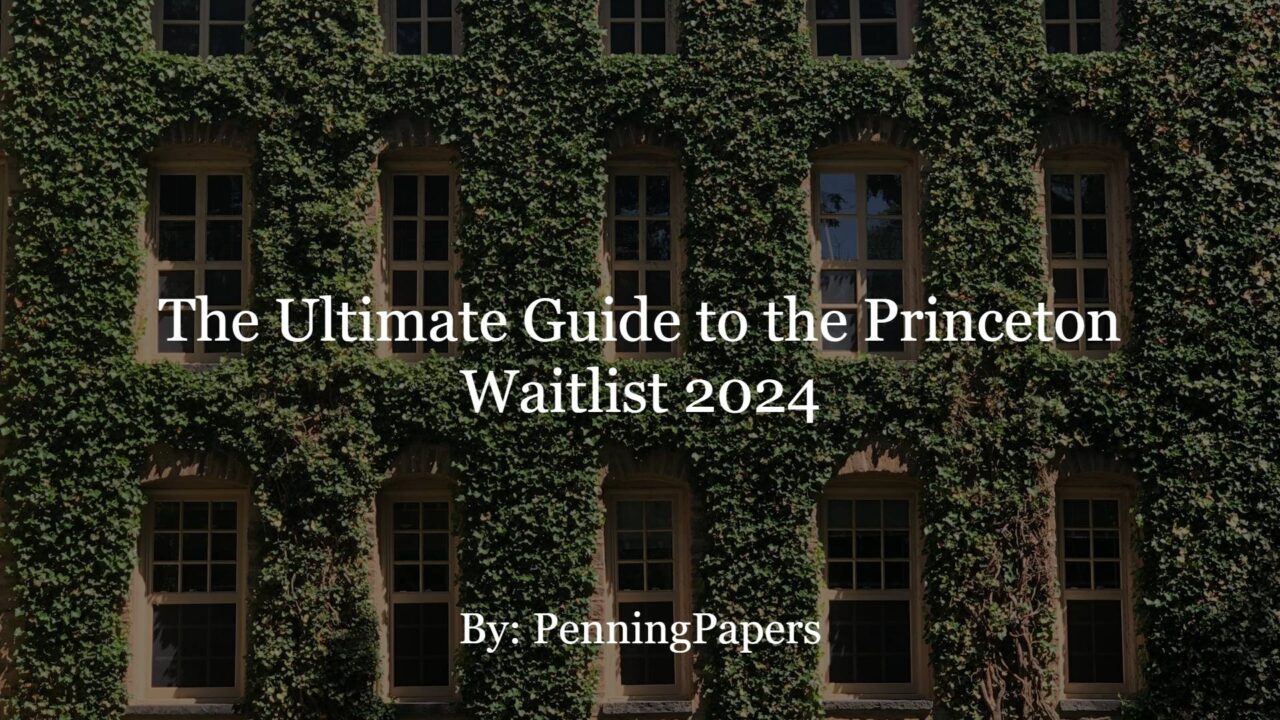If you’re reading this article, you’re probably wondering what your chances are of getting off the Princeton waitlist. Well, let’s take a look at some stats, shall we?
Princeton Waitlist Acceptance Rates
- 2003: 9.06%
- 2004: 10.99%
- 2005: 0%
- 2006: 0%
- 2007: 9.73%
- 2008: 13.95 %
- 2009: 6.4%
- 2010: 16.37%
- 2011: 2.19%
- 2012: 0%
- 2013: 3.64%
- 2014: 5.01%
- 2015: 4.55%
- 2016: 2.14%
- 2017: 12.23%
- 2018: 0%
- 2019: 0.15%
- 2020: 4.35%
- 2021 15%
- 2022: 0%
Now, here’s the thing. For the 2021-22 admissions cycle, Princeton accepted 150/1,000 students off the waitlist. That makes their waitlist acceptance rate 15%. However, in the year after (2022-23), Princeton accepted 0/1,348 students.
That’s right. Princeton’s waitlist admissions rate dipped from 15% to 0% in the span of 1 year.
We’ve also put this in visual form.

Princeton’s acceptance rate wasn’t always doom and gloom. For instance, years like 2004, 2008, 2010, 2017, and 2021 saw double digit acceptance rates. Nonetheless, acceptance rates have been drastically volatile throughout the years.
As a general rule of thumb for Ivy League waitlists: be carefully optimistic, but pessimistically ready.
That is, don’t let the dread overcome your decision making. Instead, hold out hope whilst still planning ahead.
Speaking of planning ahead…
This article will cover everything you need to know about surviving the Princeton waitlist process. If you’re lucky, you’ll get through this storm and whisked through Princeton’s pearly gates (err… stone-like castle gates.) If not, you’ll still have maximized your college ROI and achieved the best results possible within your power!
With that said, let’s get started!
Create an Ivy Waitlist Contingency Plan

If Princeton University, or any Ivy League college for that matter, waitlisted you, you’ll need a contingency plan.
A contingency plan is a map consisting of potential actions you may take depending on a multitude of outcomes. For instance, students who were waitlisted by Princeton may have the following outcomes on their mind.
- Accepted into Princeton
- Rejected by Princeton but accepted into some reach schools
- Rejected by all reach schools
- Rejected by Princeton and all target schools
- Rejected by Princeton and all target schools and most safety schools
- Rejected by all schools
Note that these are not the only possibilities that can happen. There are other outcomes that can occur.
Nonetheless, your goal is to create a map of all the possible outcomes and create plans for each of them. Princeton rejects most of their waitlisted students. So, it helps to have a backup plan for all possibilities.
Sometimes, it helps to have a professional college admissions consultant working alongside you. A good consultant can guide you toward the best path regardless of what happens; and, they have the expertise and level-headedness required to navigate this stressful process.
Write a Princeton Waitlist Letter / LOCI

Princeton does not directly instruct students to send a waitlist letter or Letter of Continued Interest (LOCI.) However, while Princeton does NOT require students submit a LOCI, students may still benefit from sending one.
Princeton uses the waitlist as an “emergency applicant pool” to pick from in case not enough students enroll. That is, according to their words… “if spaces become available, we will review the entire group of candidates on the wait list.”
So, if by chance Princeton doesn’t have enough students to admit and must accept more from the waitlist pool, you had better ensure your LOCI makes your profile stand out more from the rest.
There are two components of a solid Princeton waitlist letter or LOCI: reassurance of your interest, and new or compelling information that qualifies your existing profile.
Let’s deconstruct both these points below.
Reassure Them of Your Interest
Because Princeton does not have a formal waitlist LOCI submission portal, you will be submitting your letter via inbox. So, start with a general but professional introduction.
Something like, “Dear Princeton University Office of Undergraduate Admissions, ” works beautifully.
Next, restate your interest in attending Princeton University as your #1 school. Remember: Princeton uses the waitlist as an application pool from which they select students “if they have spots open.” So, restating your interest in Princeton as your #1 priority is crucial.
Princeton does not want to accept students from the waitlist pool who are on the fence about attending. They want certainty that they’ll meet their quota.
This is not as easy as it sounds. You can’t just say, “Princeton is my #1 school! Yay!”
You must prove to admissions officers that your interest in the campus is true and not just said for the sake of securing choices. (even if that were true.) And, this requires persuasiveness and surgical writing.
We recommend thinking of the Princeton LOCI the same way you brainstorm ideas for a persuasive essay. How do you persuade audiences of your point?
Here’s what we recommend. Don’t rely on strong emotions and hyperbole to convince admissions officers of your interest in attending. Passion can be faked. And, everyone has personal reasons to pursue Princeton regardless. Instead, highlight logical reasons why Princeton would be a great place for you to pursue your future aspirations. Are there particular things Princeton provides that will be crucial to your goals in the coming years? Basing your LOCI on these logical reasons (and being persuasive and articulate) is how you stand out.
Include New or Compelling Information
The main purpose of your Princeton LOCI is to highlight new and compelling information. Ideally, this information should reshape the way admissions officers view your original application.
Think of it like this: your original application was not enough to get accepted. So, why would restating the same information do anything different? If anything, Princeton would want to see a new perspective of your application that makes you “Princeton material.”
Here’s an example.
Let’s say after your application, you were diagnosed with ADHD. You can write your Princeton LOCI about discovering your diagnosis. This paints a new picture of your previous application, as it implies having to work harder to earn the same grades. Additionally, it adds more weight to your extracurriculars, projects, and research. For, it takes more executive function on your part to truly execute the same tasks as other fellow aspiring Princeton applicants. However, it is crucial that you clarify the significance of this new information and why it makes you a solid applicant. The LOCI is not just a place to dump new info and pray for the best. Guide admissions officers by the hand, and explain how your new info warrants reconsideration.
(Note: if you’re not confident about including mental health in your Ivy League waitlist LOCIs or appeals, check out our guide to writing about ADHD here. )
Lastly, end your Princeton LOCI by restating everything in the previous sections of your letter. Keep it concise, clear, professional, and articulate. The closing statement is a sign of grace and professionalism. While it might not say anything contextually different, it still determines the lasting impression you leave Princeton’s admissions office. Think of it like a handshake: you can be smart and clever all you like; but, a wimpy handshake is enough to give anyone an “ick!”
The Benefits of an Ivy League Waitlist Consultant (within reason)

After you’ve submitted your waitlist LOCI, wait! Don’t overreact and call the admissions office and bother them with updates. You don’t want to do anything that would soil your impression, ruining your admissions chances. Follow instructions, and don’t annoy them with any unnecessary calls or emails unless they’re specific questions within reason! Princeton doesn’t release decisions until after May 1. So, until then, don’t pester them!
Now, remember, students seldom get accepted off of Princeton’s waitlist. Some years have been particularly unlucky, when no students were accepted at all. So, you’ll need to make sure your Princeton waitlist LOCI is bulletproof.
That’s where a solid Ivy League waitlist consultant can work very well.
Remember: all you can really do during the waitlist is write a banger LOCI. But, that’s all. Everything else is just waiting. So, it may help a lot to work with a solid waitlist consultant who knows how to navigate the Princeton LOCI. However, you should be careful of consultants who offer more.
DON’T work with consultants who offer to “guarantee” acceptance off the waitlist or “pull strings” for you. These are scams. And, during these scary times, especially during Ivy League waitlist and appeals, scammers are willing to sell anything to get desperate parents to shell out thousands of dollars. Don’t fall for those.
That’s why our waitlist and appeals experts ONLY work on the waitlist or appeal letters. It’s all they need to focus on, as should you! Of course, if you want to work with some of our trusted waitlist and appeal experts, consider speaking with us! Schedule a free consultation, and we’d be happy to get back to you within 24 hours! We’ll discuss how to brainstorm, draft, and finalize your waitlist drafts to cut through the rest of the competition!

